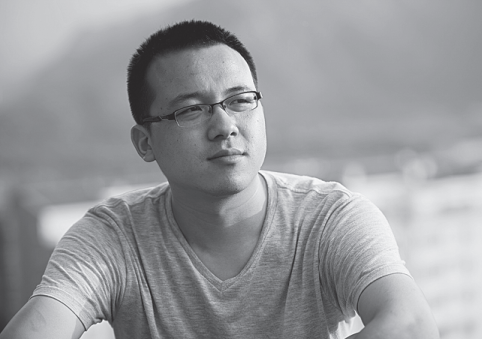A pauper to a king
Deng Anqing was born in a poor family on the banks of the Yangtze River, but with the courage of his own convictions, he built his kingdom on paper, Yang Yang reports.

In the middle of the interview, Deng Anqing stopped and took out his smartphone. He wanted to find a reader's comment posted under a podcast in which he talked about how he became a writer.
It was a day when he was a 14-year-old middle school student. A monthly magazine mailed a check to the school for running Deng's short story. After morning exercise, the headmaster took out the check and told the whole school that they had someone with talent in their ranks.
"Everyone looked at me. That day, I was in the spotlight for the first time in my life. It was such an encouragement that I aspired to become a writer,"Deng, 37, says.
He finds the comment, in which a former schoolmate writes that they, too, remembered that day.
Deng was born and grew up in a poor village Dengwan on the north bank of the Yangtze River in Central China's Hubei province. At the age of 9, his parents went across the river to grow crops in Jiangxi province, where the taxes were lower, leaving Deng with his grandfather, meaning that, all of a sudden, Deng became a "left-behind child", often having to look after himself.
Sometimes, having nothing to eat, he went hungry, watching secretly through the windows his uncle's family enjoying hearty meals. Sometimes, his father's sister came and, finding that he was starving, cooked for him.
"I remember when I was young, almost all the care and love that I got came from women," he says.
In his first semester of middle school, Deng stayed with the family of his mother's sister. Despite being treated with such kindness, as a sensitive child, he felt uneasy, unable to get along with other boys. He was a lonely child and his favorite activity was to read maps in geography textbooks, and maps of China and the world on a neighbor's wall, memorizing the locations of the cities, mountains, seas, lakes and rivers.
Gradually, just studying maps stopped satisfying his curiosity, so he started drawing maps on paper, first copying the existing maps and then created maps he imagined. He gave names to those worlds, seas, continents, countries and creatures, and imagined their stories, languages, wars, celebrities and books. As he acquired enough words, he tried to write down his imaginings.
At middle school, he had already started writing old-style poems, plays and works of other genres, and showed them to his teacher.
One night, he dreamed of a cobbler fixing a shoe, and he wrote it down when he got up. That was his first short story, which, after the teacher's revision, was published in a national monthly magazine that focused on running excellent compositions by middle school students.
The story not only earned him 10 yuan ($1.55), but also made him a star in the school.
"Before that day, I was invisible," he says.
With mediocre results in his college entrance examination, Deng went to a less well-known college of science and technology to study Chinese language and literature. At the college, he spent a lot of time voraciously reading Chinese literary works by Zhang Wei, Chi Li, Mo Yan, Jia Pingwa and Wang Anyi.
Despite completing all his courses with excellent grades, he graduated without certificates because he did not have money to pay the school fees for his final two years.
As a result, he could only find low-paying jobs-writer for an advertisement company with a monthly salary of 600 yuan, publicity worker for a glasses store, or secretary to a company's boss.
At the end of 2008, he got a job at a timber mill in Suzhou, East China's Jiangsu province. In his free time, he loved watching Kunqu Opera. One day, one of his friends sent him a link to Kunqu Opera performances on entertainment review site Douban.
Deng will never forget the day, May 3, 2009, when he registered on Douban as a user named "Kingdom on the Paper". He started writing essays and short stories about his hometown, posted them on the website and gradually attracted more readers.
In 2011, he received a message asking whether he was interested in publishing a book. He thought it was a fraud but considering that he had nothing to be swindled of, he agreed. That year, his first book, Kingdom on the Paper, was published. He moved from Suzhou to Beijing, starting his career as a writer.
So far, he has published seven books, including collections of essays and short stories, and a novel. Some of his stories have been translated into Italian, English and Japanese.
In 2019, he saw a singer on TV perform a song called A River Separated Us Forever. He says it was at that moment, he suddenly felt there was a book waiting for him to write, because he grew up beside a big river and was familiar with the people and life on the banks of a major waterway.
At that time, Deng was working on a novella collection he had started in 2017. He planned to write three stories of 30,000 to 50,000 words each. However, when he finished the first, he says he felt there was an element that could be developed into an independent story, so he wrote the second, which gave him the inspiration to write the third. When he finished the third, he realized that it was another book.
He says he never wrote so quickly and smoothly, as if god had borrowed his hands to create the stories, and once he was touched, sentences would spring out of his body.
"Writing is such a splendid thing," he says.
At that time, he was an editor at a publishing company, so he wrote in his spare time before and after work. At the speed of 5,000 words a day, he finished the book in 45 days. Earlier this year, the collection Yongge Yijiangshui (A River Separated Us Forever) was released.
"It is like a summary of my writing over the past decade," he says.
The book consists of seven novellas about the village called Dengwan by the Yangtze River. From spring to winter, in simple but vivid language, with a local dialect, the novellas recount the innocent days of two boys, reflecting the problems which affect families, "left-behind children", the loneliness of the elderly, preference for sons over daughters, and education in rural areas. Each story is independent and complete, but they, in a chronological order, form the bigger picture of a novel.
Like in previous books, Deng also shows his sympathy with, and love for, women in rural areas, "because I witnessed a lot of awful things happening to women, such as domestic violence or abandoned baby girls".
"It was so unfair, so I want to write about them," he says.
Now a freelancer after living in Beijing for 10 years, Deng is considering buying a home in Suzhou.
Writing has helped pull him from a mire in life. "If I had not written, what would my life have become?" he ponders.
"Honestly, I am just a very ordinary person. Everything about me is ordinary, but only writing can gradually make me outstanding, and allow me to experience more things," he says.
By writing, Deng has not only made a living, but used the royalties from his books to travel to more than 20 countries and regions around the world.
"Writing gives me a life that I like. I couldn't have imagined a life like this when I was young, but now that it has come to pass, I consider it a gift," he says.



Today's Top News
- China bids to cement Cambodian-Thai truce
- Fiscal policy for 2026 to be more proactive
- Revised law to spur high-level opening-up
- High-speed rail mirror of China's modernization
- China will deliver humanitarian aid to Cambodia
- The US 2025: a year of deep division






























